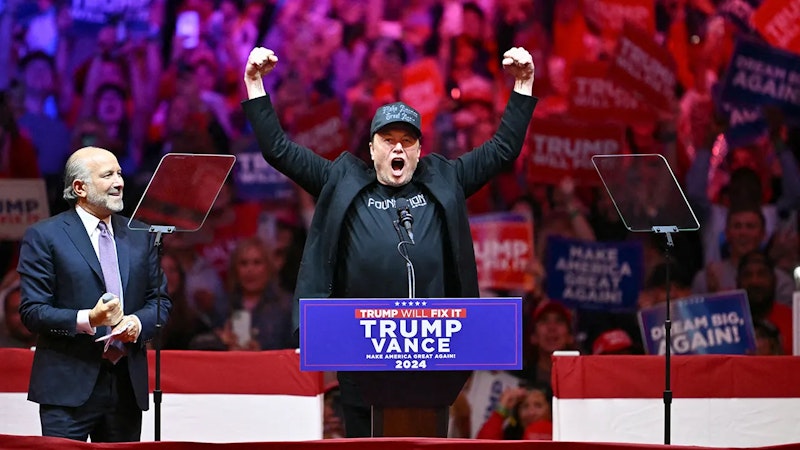I find it hard to turn my eyes away from X, despite, or more likely because of, its repulsiveness. I was intrigued by the J.D. Vance tweet advising people to “reevaluate assumptions,” as that’s a tenet I hold, but his comment, “If you were confident that Donald J. Trump was going to lose, maybe you should question what else you ‘know’ about him. Maybe the people who misled you about his electoral chances have misled you about other things,” missed the mark, as I’d been reading the pessimistic Bulwark for months. Vance added, “In the words of Cormac McCarthy, ‘If the rule you followed brought you to this, of what use was the rule?’” which I was reminded was a line of Anton Chigurh, the relentless killer from No Country for Old Men, who says it while pointing a long gun at hitman Carson Wells, before killing him.
That this was the thought that the Vice President-Elect of the United States hit upon in addressing those who didn’t vote for him was telling. Incidentally, the father of Woody Harrelson, who played Wells in the movie of the McCarthy book, was a hitman, Charles Voyde Harrelson, whom the actor visited in ADX Florence, the federal supermax prison. The elder Harrelson once wrote of his life in a small cell there, “I have my family and friends. I still have a relatively intact mind. It could be infinitely worse.”
An X thread by a British writer named Tom Bacon intrigued me. He drew parallels between Trump’s victory and the ascension to power of Boris Johnson, who “ran Downing Street like an old Medieval court, where people vied for his patronage,” and “Johnson's attention moved from one thing to another, lacking any real direction.” Bacon’s take was, in a roundabout way, optimistic: “Trump is Johnson multiplied by a factor of ten or more. Do NOT expect a coherent agenda.” He also noted as a factor: “events, dear boy, events.”
That wording was vaguely familiar. Looking it up I found it’s a quote attributed to Harold MacMillan, the British prime minister, and leader of the Conservative Party, from 1957 to 1963. The story is that “Events, dear boy, events” was MacMillan’s answer when asked a question about what his greatest challenge in office had been, or why governments get disrupted from their plans. Winston Churchill had said something similar about “the opposition of events.” He also worried about “falling below the level of events,” and felt that had occurred in a critical World War I juncture, when the Russians failed to take up a Greek offer to join the Entente against the Central Powers. “Quos Deus vult perdere prius dementat,” Churchill lamented. Whom God (or the gods) would destroy, they first make mad.
Always on the lookout for alternatives to X, I started an account at Bluesky. As of this writing, I have zero followers there, so there may be an opportunity to be the first one, or even the only one. I can’t imagine I’ll leave X altogether, though, as it’s where I interact with Steven J. Giardini and perhaps other readers. I also think I was wrong in believing that Elon Musk had erred in buying what was then Twitter, on grounds that it would be a massive distraction from his other businesses. It’s been an investment that paid off in political influence, with immeasurable potential for the bottom line of all his enterprises.
“To what purpose should I trouble myself in searching out the secrets of the stars, having death or slavery continually before my eyes?” That was the pre-Socratic philosopher Anaximenes, asking a question of Pythagoras, as recounted in an essay by Michel de Montaigne, and used by Carl Sagan in his 1980 book Cosmos, as an opener for the last chapter “Who Speaks for Earth?” which is mostly about the threat of nuclear war. I’ve been reminded of that quote in following astronomy news.
Musk has made it harder for telescopes to see the stars. Thousands of satellites placed in orbit in recent years, with many more to come, turn astronomical images into a mess of streaks. In October, space scientists sent a letter to the Federal Communications Commission asking for environmental reviews of planned launches. But the largest among the satellite mega-constellations is Musk’s Starlink, and even before the election, House Republicans were pressuring the FCC over a decision not to provide subsidies to Starlink. Neither astronomers nor the FCC will influence anything Musk does.
I recently wrote about free will in discussing the election results. Along such lines, I follow René Dubos, French-American biologist and humanist, who noted in the 1960s that “experience shows that human beings are not passive components in adaptive systems,” and later that “human beings are rarely passive witnesses of threatening situations. The logical future, determined by past and present conditions, is less and less important than the willed future which is largely brought about by deliberate choices—made by the human free will.” Anthropologist Donald Ortner in the 1980s drew on Dubos’ work in noting that people’s “responses to threats may be unwise but they inevitably alter the course of events and make mockery of any attempt to predict the future from extrapolation of existing trends.”
—Kenneth Silber is author of In DeWitt’s Footsteps: Seeing History on the Erie Canal.

